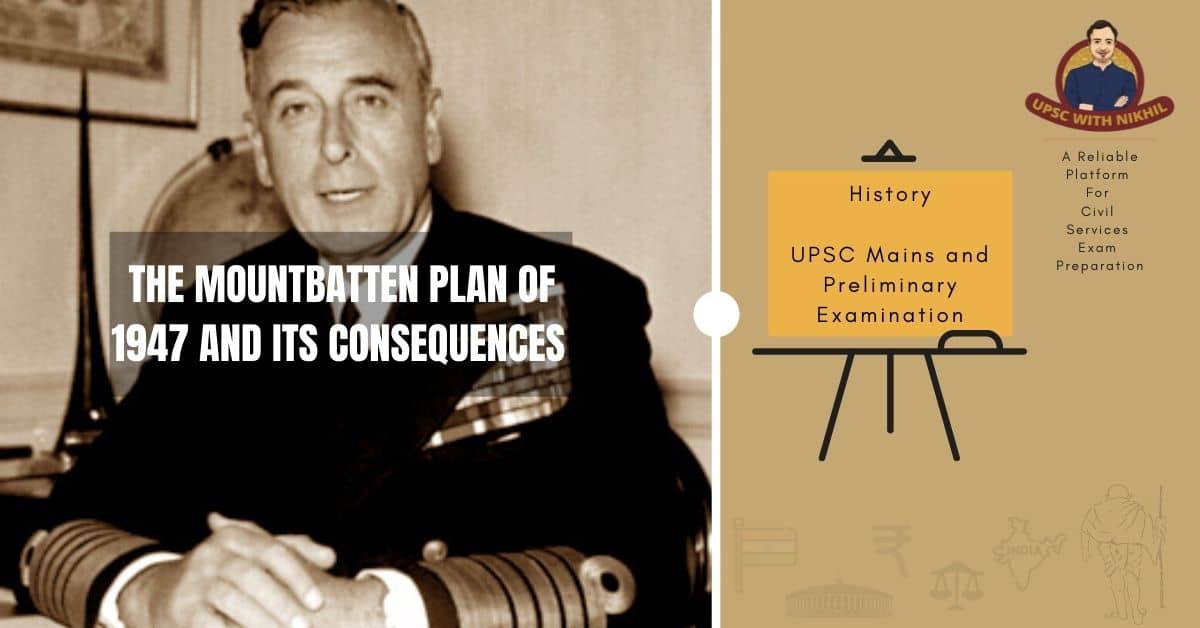The Mountbatten Plan Of 1947 And Its Consequences
The Mountbatten Plan, also known as the 3rd June, 1947 Plan, aimed to achieve an early transfer of power to two successor states, India and Pakistan, on the basis of Dominion Status. Congress was willing to accept Dominion Status for a time because it believed it needed to assume full power right away and confront the country's explosive situation.
Murder stalks the streets, and the most incredible cruelties are perpetrated by both individuals and mobs, as Nehru put it. Apart from that, Dominion Status gave the new administration breathing room by allowing British officers and civil service officials to stay on for a while longer, allowing Indians to settle into their new positions of authority more easily.

• Dominion Status offered Britain the chance to keep India in the Commonwealth, even if only temporarily, a prize not to be passed up. Though Jinnah offered to bring Pakistan into the Commonwealth, India's Commonwealth membership was valued more because of India's economic strength and defense potential, as well as Britain's greater value of trade and investment there.
• The reason for the early transfer of power, on August 15, 1947, was to ensure Congress's agreement to Dominion Status.
• The British could also absolve themselves of responsibility for the rapidly deteriorating communal situation. Some officials were content to pack their belongings and leave the Indians to stew in their own juice as it was.
• The situation, as Patel explained to the Viceroy, was one in which “you won't govern yourself, and you won't let us govern.”
• Mountbatten was to defend his decision to push the date forward to August 15, 1947, by claiming that things would have blown up in their faces if they hadn't gotten out in time. August 1947, according to Ismay, the Viceroy's Chief of Staff, was too late, not too soon. A hasty retreat was perhaps the most appropriate action from the British perspective.
• As Mountbatten and Ismay would have us believe, this does not make it the only option.
• Despite the government's steady erosion of authority, the situation of responsibility without power remained a possibility rather than a reality.
• The British could assert their authority in the short term, but did not want to, as Kripalani, the then-President of the Congress, pointed out to Mountbatten.
• Furthermore, rather than justifying the removal of authority, the situation demanded that it be exercised. If the abdication of responsibility was callous, the haste with which it was carried out exacerbated the situation.
• The 72-day timetable for both power transfer and country division, which ran from June 3 to August 15, 1947, proved disastrous. Senior Indian officials such as Punjab Governor Jenkins and Commander-in-Chief Auchinleck believed that a peaceful division would take at least a few years.
• In the end, the Partition Council had to divide assets in a matter of weeks, down to typewriters and printing presses. There were no transitional institutional structures in place to deal with the thorny issues that arose as a result of the division.
• Mountbatten had hoped to serve as the common Governor-General of India and Pakistan, bridging the gap between the two countries, but this was not to be, as Jinnah desired the position. As a result, the joint defence machinery established did not last beyond December 1947, when Kashmir had already devolved into a military conflict rather than a political settlement.
• Mountbatten's final indictment came in the form of the Punjab massacres that accompanied Partition. On September 16, 1947, his devoted aide Ismay wrote to his wife, "Our mission was so very nearly a success: it is sad that it has ended up such a grim and total failure."
• The early date (15 August 1947) and the delay in announcing the Boundary Commission Award, both decisions made by Mountbatten, added to the tragedy. Brigadier Bristow, a senior army official stationed in Punjab in 1947, believed that the Punjab tragedy could have been avoided if partition had been delayed for a year or so.
• ‘Had officials in every grade in the civil service, and all the personnel of the armed services, been in position in their respective new countries before Independence Day, it seems there would have been a better chance of preventing widespread disorder,' said Lockhart, who was Commander-in-Chief of the Indian Army from 15 August to 31 December 1947.
• The Boundary Commission Award was completed by August 12, 1947, but Mountbatten decided to make it public after Independence Day so that the British would not be held responsible.
• Strange things happened in Punjab and Bengal on Independence Day. Flags of both India and Pakistan flew high in villages between Lahore and Amritsar, indicating that both communities believed they were on the right side of the border. The morning after their liberation, they were found aliens in their own homes, exiled by executive order.


